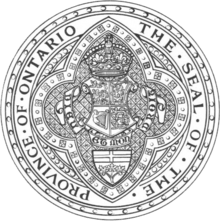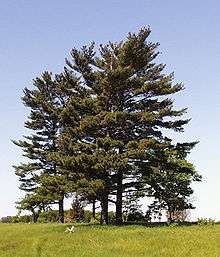Symbols of Ontario

Ontario is one of Canada's provinces, and has established several provincial symbols.[1] [2]
Official symbols
| Symbol | Image | Adopted | Remarks | |
|---|---|---|---|---|
| Coat of arms | Coat of Arms of Ontario |  |
1868 and 1909 [2] | The original arms, consisting of current-day Escutcheon, granted by Royal warrant from Queen Victoria on May 26, 1868. Addition of supporters, crest, and motto, granted on February 27, 1909 by Royal warrant from King Edward VII. [3] |
| Motto | Ut incepit fidelis sic permanet Loyal she began, loyal she remains (alternatively) Loyal she began, thus she remains [2] |
1909 [2] | Granted with other elements of the coat of arms | |
| Flag | Flag of Ontario | |
May 21, 1965[1] | It is a defaced Red Ensign, with the Royal Union Flag in the Canton, representing Ontario’s roots as a part of the British Empire, and the Ontario Shield of Arms in the Fly, symbolizing the province’s loyalty to Canada. [1] The flag was introduced in 1965 in the wake of lengthy debates on changing the Canadian Red Ensign with a unique Canadian flag. |
| The Great Seal | The Great Seal of the Province of Ontario |  |
January 1, 1870 [1] | The Great Seal was authorized by an Order-in-Council. |
| Bird | Common loon Gavia immer |
 |
June 23, 1994[2] | The is displayed on the Canadian One Dollar Coin, the coin is commonly called a "Loonie". |
| Tree | Eastern white pine Pinus strobus |
 |
May 1, 1984[2] | Found throughout Ontario, the eastern white pine is the tallest tree in the province and can live over 250 years. Known as "the Tree of Great Peace" by the Haudenosaunee First Nations of Southern Ontario. The eastern white pine was also an important source of income and trade during the province’s early days. [2] |
| Gemstone | Amethyst |  |
1975 [2] | Amethyst can be found in clusters throughout northern Ontario, concentrating around the area of Thunder Bay. [2] |
| Flower | White trillium Trillium grandiflorum |
 |
1937[2] | The adoption of the White Trillium grew out of a movement during the First World War to choose a national floral emblem appropriate for planting on the graves of Canadian servicemen overseas. Found in the forests and woodlands of Ontario, it blooms in late April and May. They are very sensitive to light and usually bend toward the sun as it moves across the sky. Contrary to popular belief, it is not illegal to pick a White Trillium in Ontario. However, picking the flower can seriously injure the plant and it can take years to recover. [2] |
| Tartan | Red and white with three shades of green and two shades of blue | June 23, 2000 [1] | Ontario tartan is made up of four blocks of colour: red, white, three shades of green and two shades of blue. The shades of green represent the forests and fields of Ontario, while the blue represents the waters. The red represents its First Nations and the white, the sky over the province. [2] | |
| Emblem of the Lieutenant-Governor | Emblem of the Lieutenant-Governor |  |
Consists of the Escutcheon of Arms of Ontario, surmounted by St. Edward's Crown, surrounded by ten golden maple leaves. | |
| Flag of the Lieutenant-Governor | Flag of the Lieutenant-Governor of Ontario | |
May 13, 1981 [4] | Consists of the Escutcheon of Arms of Ontario, surmounted by St. Edward's Crown, on a blue field, surrounded by ten golden maple leaves.
It is flown outside the suite at Queen's Park when the Lieutenant Governor is in the provincial capital, Toronto. It is also displayed in the Lieutenant Governor’s office and in the Music Room, where ceremonies take place. It is mounted on the car in which the Lieutenant Governor travels, and is flown at public buildings, Canadian Forces establishments, and on Her Majesty’s Canadian Ships during official visits. [4] The standard takes precedence over all other flags in Ontario, including the National Flag of Canada, except in the presence of The Queen, when The Queen’s Personal Canadian Flag is flown instead. The standard also precedes that of the Governor General in cases where the Lieutenant Governor is hosting an event at which the Governor General of Canada is present. The standard is never lowered to half-mast; however, on the death of the Lieutenant Governor, it is taken down until a successor is installed. [4] |
| Franco-Ontarian Flag | Franco-Ontarian Flag | |
June 29, 2001 [1] | Recognized under provincial law as the emblem of the French-speaking community in Ontario. |
| Logo | Provincial wordmark 2007 |
|
2007 | Current wordmark of the Government of Ontario |
| Logo | Provincial wordmark late 1960s |
|
Late-1960s | The previous wordmark of the Government of Ontario. |
| Provincial Brand | Trillium | 2006 | Replaced an earlier Trillium brand introduced in 1964 [5] | |
| Provincial Licence plate slogan | Yours to Discover | 1982 | Replaced earlier slogan Keep it Beautiful c.1973; Tant à découvrir was added in 2003 | |
| Provincial colours | Green and gold[6][7] or Yellow [2] |
References
- 1 2 3 4 5 6 Legislative Assembly of Ontario. "Ontario’s Symbols". Retrieved 2016-06-21.
- 1 2 3 4 5 6 7 8 9 10 11 12 13 Government of Canada. "Ontario’s provincial symbols". Retrieved 2017-05-16.
- ↑ "Royal Heraldry Society of Canada – Arms of Canada's Provinces and Territories". RHSC. 3 May 2004. Retrieved 6 October 2008.
- 1 2 3 "Symbols of Office". Retrieved 2017-05-16.
- ↑ "Critics stomp on new trillium logo". CBC News. June 26, 2006.
- ↑ "ATTRACTIONS ONTARIO". Attractions Ontario. Retrieved 2010-11-11.
- ↑ "Lieutenant Governor’s Community Volunteer Award". Government of Ontario. Retrieved 2014-01-07.